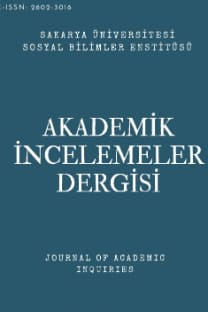Stalin Dönemi (1928-53) Sovyet Tarih Yazımında Türkistan_Orta Asya
Tarih yazımı, Sovyetler Birliği, Türkistan, Orta Asya
Turkestan/Central Asia in the Stalin Period (1928-53) Soviet Historiography
Historiography, Soviet Union, Turkestan, Central Asia,
___
- Afanas’ev, Iu. N. “The Phenomenon of Soviet Historiography”. Russian Studies in History 40/2 (2001), 32-64. https://doi.org/10.2753/RSH1061-1983400232
- Aydingün, Ayşegül vd. “Conversion of Ajarians to Orthodox Christianity: Different Narratives and Perceptions”. Europe-Asia Studies 71/2 (07 Şubat 2019), 290-314. https://doi.org/10.1080/09668136.2018.1543651
- Bacon, Elizabeth E. Central Asians under Russian Rule. New York: Cornell University Press, 1980.
- Bennigsen, Alexandre. “Colonization and Decolonization in the Soviet Union”. Journal of Contemporary History 4/1 (1969), 141-151.
- Braginsky, I. S. vd. Central Asia and Kazakhstan in the Soviet Original Studies. thk. B. G. Gafurov - Y. V. Gankovsky. Moskova: Nauka Publishing House Central Department of Oriental Literature, 1967.
- Bregel, Yuri. Notes on the Study of Central Asia. Indiana: Indiana University Research Institute for Inner Asian Studies, 1996.
- Brunstedt, Jonathan. The Soviet Myth of World War II Patriotic Memory and the Russian Question in the USSR. Cambridge: Cambridge University Press, 2021.
- Capisani, Giampaolo R. Handbook of Central Asia. London: I. B. Tauris, 2000.
- Connor, Walker. “Soviet Policy towards the non-Russian Peoples in Theoretic and Historical Perspective: What Gorbachev Inherited”. The Post-Soviet Nations: Perspectives on the Demise of the USSR. ed. Alexander J. Motyl. 30-49. New York: Columbia University Press, 1992.
- Conquest, Robert (ed.). Soviet Nationalities Policy in Practice. London: The Bodley Head, 1967.
- Eden, Jeff. God Save the USSR Soviet Muslims and the Second World War. Oxford: Oxford University Press, 2021.
- Enteen, M. George vd. Soviet Historians and the Study of Russian Imperialism. University Park: Pennsylvania State University Press, 1979.
- Evans, Richard J. Tarihin Savunusu. çev. Uygur Kocabaşoğlu. Ankara: İmge Yayınları, 1999.
- Fierman, William. “The Soviet ‘Transformation’ of Central Asia”. Soviet Central Asia: The Failed Transformation. ed. William Fierman. 11-35. Boulder: Westview Press, 1st edition., 1991.
- Fruchet, Henri. “The Use of History The Soviet Historiography of Khan Kenesary Kasimov”. Central Asia Aspects of Transition. ed. Tom Everett-Heath. 132-145. New York: RoutledgeCurzon, 2003.
- Kara, Abdulvahap. “Ermukhan Bekmakhanov and Ideological Repsessions and Limitations in the Research of Kazakh History in the Soviet Period”. The Soviet Historiography and Questions of Kazakhstan History A Retrospective of the Life and Works of The First Kazakh Historian Ermukhan Bekmakhanov. ed. Abdulvahap Kara vd. İstanbul: Türk Dünyası Belediyeler Birliği, 2016. http://www.tdbb.org.tr/tdbb/wp-content/uploads/2016/12/SOVYET-TARIH-YAZICILIGI-ENG.pdf
- Kendirbaeva, Gulnar. “We are Children of Alash…”. Central Asian Survey 18/1 (1999), 5-36. https://doi.org/10.1080/02634939995722
- Kırımal, Edige. “Kırım’da Topyekûn Tehcir ve Katliam”. Dergi (Dergi, Sovyetler Birliğini Öğrenme Enstitüsü) 2/4 (1956), 13-34.
- King, David. The Commissar Vanishes The Falsification of Photographs and Art in Stalin’s Russia. London: Tate Publishing, 2014.
- Kolarz, Walter. Russia and Her Colonies. London: George Philip and Son Limited, 1953.
- Kononov, A. N. Turkic Philology. thk. B. G. Gafurov - Y. V. Gankovsky. Moskova: Nauka Publishing House Central Department of Oriental Literature, 1967.
- Kort, Michael. Central Asian Republics. New York: Facts On File, 2004.
- Mazour, Anatole G. Modern Russian Historiography. Westport: Greenwood Press, 1975.
- Mazour, Anatole G. The Writing of History in the Soviet Union, California. California: Hoover institution Press, 1971.
- Perry, Matt. Marksizm ve Tarih. çev. Gül Tunçer. İstanbul: İletişim, 2010.
- Roy, Olivier. Yeni Orta Asya ya da Ulusların İmal Edilişi. çev. Mehmet Moralı. İstanbul: Metis, 2. Basım., 2005.
- Sakharov, A. M. “Historiography”. çev. J. T. McDermott. Information USSR. ed. Robert Maxwell. 540-556. New York: The Macmillian Company, 1962.
- Shnirelman, Victor A. “From Internationalism to Nationalism: Forgotten Pages of Soviet Archaeology in the 1930s and 1940s”. çev. Philip L. Kohl - Clare Fawcett. Nationalism, Politics and the Practice of Archaeology. 120-138. Cambridge: Cambridge University Press, 2000.
- Slezkine, Yuri. “The USSR as a Communal Apartment or How a Socialist State Promoted Ethnic Particularism”. Slavic Review 53/2 (1994), 414-452. https://doi.org/10.2307/2501300
- Smith, Graham vd. Nation-building in the Post-Soviet Borderlands. Cambridge: Cambridge University Press, 1998.
- Stalin. “Toast to the Russian People at a Reception in Honour of Red Army Commanders Given by the Soviet Government in the Kremlin on Thursday, May 24, 1945”. 1945. Erişim 30 Aralık 2022. https://www.marxists.org/reference/archive/stalin/works/1945/05/24.htm
- Taşağıl, Ahmet. “Türkistan”. TDV İslâm Ansiklopedisi. 2012. Erişim 27 Mart 2023. https://islamansiklopedisi.org.tr/turkistan
- Tillett, Lowell. The Great Friendship Soviet Historians on the Non-Russian Nationalisties. The University of North Carolina Press, 1969.
- Tishkov, Valery. “Modern Soviet Historiography”. Int. Soc. Sci. J. 33/4 (1981), 650-666.
- Valikhanov, E. “National liberation struggle of the Kazak people against the Russian Colonialism”. History of Kazakhstan Essays. 104-113. Almaty, 1998.
- Wheeler, Geoffrey. The Modern History of Soviet Central Asia. New York: Praeger, 1964.
- Zemtsov, Ilya. Encyclopedia of Soviet Life. New Jersey: Transaction Publishers, 2001. джамгерчинов, в. д. - хасанов, А. Х. “присоединение киргизии к россии”. история киргизии учебное пособие для средней школы. ed. А. Г. зима vd. фрунзе: киргизкое государственное учебно-педагогическое издательство, 1957.
- Yayın Aralığı: 2
- Başlangıç: 2006
- Yayıncı: Sakarya Üniversitesi Sosyal Bilimler Enstitüsü
1845 Tarihli Temettuat Defterine Göre Ağsaklar/Aksaklar Köyü
Kürtaj Tartışmaları Bağlamında Örtüşen Görüşbirliğinin Teorik İncelemesi
Orna Donath. Annelikten Pişman Olmak (çev. Bilge Yalçın). İstanbul: İletişim Yayınları, 2022, 254 s.
Sosyo-Politik Gelişmişlik ve Çevre Göstergeleri
Fiyat Arttırma ve Negatif Dengeleme Stratejileri Ekseninde Çin’in Körfez ve Suudi Arabistan Siyaseti
Toplumsal Değişimde Göç Olgusunun Kültürel Güvenliğe Yansıması
Stalin Dönemi (1928-53) Sovyet Tarih Yazımında Türkistan_Orta Asya
Afrika’da Kalkınmacı Devlet: Morityus Mucizesi
Rusya - Ukrayna Çatışmasında Medyada Üretilen İşgal Söylemine Etik Bağlamda Bir Eleştiri
